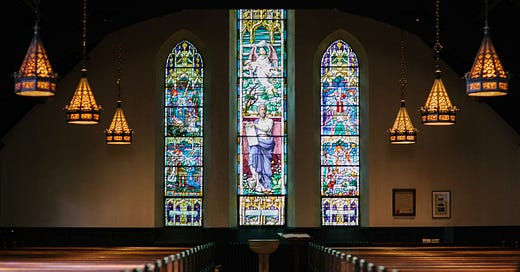I preached a sermon a couple weeks ago that caused me to think about why I go to church. One answer that isn’t very enlightening is that it has become a habit. Over years and years of repetition, I’m not sure I would know what to do with myself if I were to stay home. There have been times when I didn’t want to go. Some of those times I was the uninspiring pastor, and I just didn’t want to admit it.
But I’ve continued to attend, and so it was a reasonable question to ask why. I’m not one of those people who believes that you must go to church to get to heaven. I think that determination depends more on God than it does on me. The idea of grace resonates with me (and in me and through me), and I’m more than willing to accept that gift. So I don’t feel that it’s required somehow to put my body in a pew.
I also don’t believe that you have to go to church to be a Christian. I’m pretty sure that some church groups have done well by selling this idea, but that is more institutional marketing than anything that Jesus talked about. Of course, he was Jewish, so he had different obligations.
So why do I go? I put together a list.
Because of tradition. Throughout church history, people have gone to church regularly and have gained all kinds of insight and wisdom that has often changed their lives for the better. The routine provides a structure that gives people shared experiences and a rhythm that is comforting. This tradition also gives me some understanding of choices and decisions that were made by our ancestors.
To be still and focused. In most of the rest of my life, I am juggling multiple priorities and running from one activity to another. At church, I have time to be quiet and listen. It’s a different kind of meditation.
To pray. Prayer has become a valuable part of my life, but that doesn’t mean that I don’t forget to do it at times. In a worship service, I have the opportunity to participate in communal prayer, where I may hear themes and concerns that can be incorporated into my own thoughts and prayers later. It also gets me into an attitude of prayer — a different mindset that is more amenable (no pun intended) to listening and thinking deeply.
To be in community. There are several benefits to being with other people. I can be challenged when others think differently than I do, I can feel supported when we agree, and I can learn from experiences that are not my own. Community also provides an important component of discernment. We all have times when we don’t know what to do next, or when we are struggling with an important issue. The voices of others can help provide perspective to decision making, and can be reassuring.
To be broken. This is a weird one. Most of us try to avoid pain and sadness. But I think this avoidance, taken to extremes by some, can remove us from the real difficulties of life. If we are successful, we may begin to isolate ourselves from reality, and ultimately be unprepared when normal human problems show up in our lives. In church, I’m reminded of the many challenges that people face — illness, ethics, relationships, money — and the creativity, perseverance, and help from others that it takes to negotiate these issues.
To be reminded that there is more. Some days, especially those days when I watch the news, I get discouraged. It can feel that lots of things are going in the wrong direction, might makes right, and there is nothing to be done about it. Church often breaks me out of these feelings. I am reminded that we have been facing difficulties for thousands of years, and we have survived. It also brings me a different perspective, one that says today’s suffering is not the end. It gives me hope for the future of a better world here on earth, and a hope for something beyond this world.
To get other perspectives on scripture and everything else. My life is enriched by the diversity of thought that I encounter when we study together, or even when I hear a view that I disagree with. Sometimes my disagreement gives me the motivation to study more, to prove my point or prove myself wrong. Just having these conversations makes me smarter.
To experience joy. There is nothing quite like sharing in some special occasion that brings happiness to another. Weddings, baptisms, news of recoveries, and silly jokes can all be experienced with others, and those happy moments often occur in church. The support felt during sad times can also bring a different type of joy, a deep feeling of connection and care. You can find this feeling in other places too, but I seem to experience it more in my worshipping community.
To make a difference. I can do some things on my own, but it takes a group to make a real impact on an issue. The people in my church have a real passion to help others, and together they can do amazing things — support immigrant families, feed hundreds of hungry people, develop a letter-writing campaign, and join with others to help out during natural disasters. I couldn’t do any of these things on my own.
To seek the presence of the Holy. This is the big one. I believe you can have an experience of God anytime, anywhere. When I am in a church, it just feels easier. Maybe those architects really know what they’re doing, or maybe I’m just more psychologically open to the feeling when I enter a church, but I like being there.
See you on Sunday!







Very thoughtfully written, Bob. Got me thinking of why I go. Gail